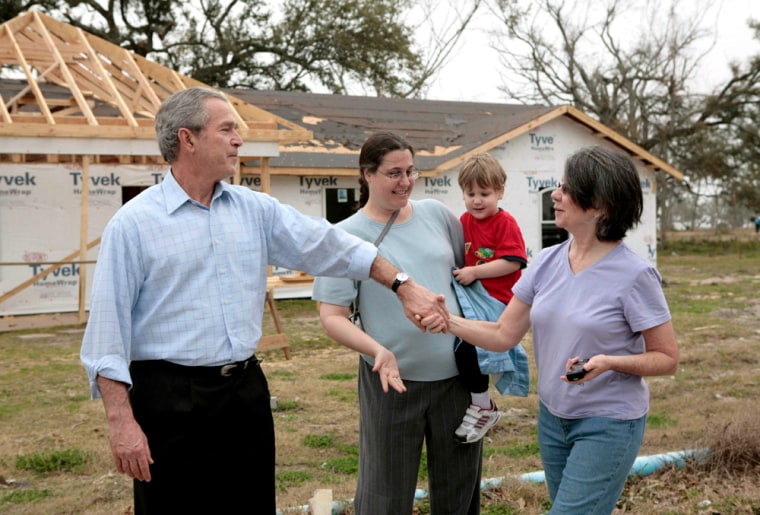President Bush on Thursday toured five homes in a neighborhood recovering from Hurricane Katrina and declared “there is hope” for the whole battered region.
“I want the taxpayers of the United States to see firsthand what their money has done to help revitalize a series of communities that were literally wiped out,” Bush said.
He stood on the sandy front yard of a home owned by Ernie and Cheryl Woodward, who rebuilt with the help of a federal grant. Bush gave them an American flag to hang outside.
“Times are changing for the better,” Bush said. “People’s lives are improving. And there is hope.”
The sentiment isn’t shared by many who live along the storm’s brutal path — particularly in New Orleans. Much of the city is in ruins, crime has soared and health care is limited. Large numbers of residents are so frustrated they are thinking of getting out for good.
Bush was to visit New Orleans later in the day.
No estimate for recovery date
In southern Mississippi, Bush walked from house to house, getting a friendly reception.
“Staying busy?” he asked a construction crew. One of the workers told him the crew was still working on the same block of the neighborhood — one-and-a-half years after the storm.
Earlier, the federal official overseeing recovery efforts said Hurricane Katrina’s damage was so vast that it’s hard to estimate when the recovery will be completed.
“We all have a sense of urgency,” Don Powell, Bush’s coordinator for the Gulf Coast recovery, told reporters.
“But I think it’s important to put it in perspective about the size of the storm, and how overwhelming this storm was,” Powell said. “I think there’s been some good progress.”
The monster hurricane in 2005 was the most destructive natural disaster in U.S. history.
Of $110 billion in relief aid that Congress has approved, $86 billion has been committed to projects, and $53 billion has been spent, Powell told reporters aboard Air Force One.
Schools and businesses have long reopened and families are returning home, he said.
Yet in the region, particularly in New Orleans, frustration is soaring over sporadic progress.
Natural and man-made disaster
Bush headed from Long Beach to Biloxi, Miss., for an update from Mississippi leaders. He was to spend his afternoon in New Orleans, with a speech at a charter school.
Bush’s trip is his 14th to the Gulf Region since Hurricane Katrina hit in August 2005, but his first in six months. He last did a tour on the one-year anniversary of the massive storm.
The administration’s initial response was widely seen as a failure. The White House has since sought to reassure local residents — and the nation — that it is committed to recovery.
Bush is still dogged by criticism about Katrina. Exasperated officials from the region said it was telling that Katrina didn’t get a mention in his State of the Union speech in January.
The White House says Bush has helped make the $110 billion in aid available for rebuilding, education, and rental assistance. His Cabinet secretaries have visited the region dozens of times.
Bush’s aides also say state and local leaders share responsibility for any delays.
Powell underscored that point on Thursday.
“American taxpayers have poured a lot of money in that area,” he said. “It’s important that the locals — that local people — begin to push a process” to get the money where it is needed.
Ahead of Bush’s visit, congressional Democrats promised new legislative help for residents.
“Hurricane Katrina was a natural disaster, compounded by a man-made disaster. It is now 18 months past time to get our response right,” House Speaker Nancy Pelosi said in a joint statement with Majority Leader Steny Hoyer and Majority Whip James Clyburn.
